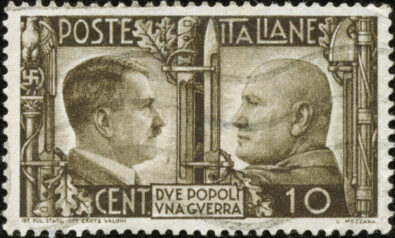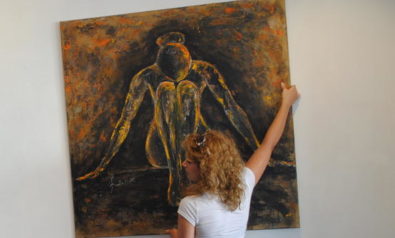
What role does politics play in the arts?
Vladimir Nabokov in his "Lectures on Russian Literature" from 1981, states that the Russian tsars were already "aware that anything outstanding and original in the way of creative thought was a jarring note and a stride towards revolution", which of course in their eyes was a bad thing. History has shown that art and politics are not necessarily in mutual opposition. Non-conformist ideas have always fascinated artists. Therefore one could rather state that art is not merely in opposition with politics, but with the establishment.
However, some artists have been very accommodating with that too. Think about leaders throughout time, who offered housing and remuneration to talented individuals. The universal genius Leonardo Da Vinci for instance was supported by Louis XII and Charles d'Amboise, who provided him with all he needed and more. Even recent totalitarian regimes gave room to the arts – as long as they were not openly opposing themselves to the recommended aesthetic standards. Only few grand artists however managed to play by the rules without sacrificing their personal standards. One prominent example would be Dmitri Shostakovich, who while writing hymns for the Stalinist regime also created complex symphonies. Compatriot and cello virtuoso Mstislav Rostropovich, who gave a public concert on the occasion of the tearing down of the Berlin wall, believes them to be in reality a "secret history of Russia". Shostakovich certainly did not have an easy position: his fourth symphony, influenced by Gustav Mahler, represented a shift in style. This did not go unnoticed and in consequence he soon withdrew it for unknown reasons – a decision which probably saved his life. However after composing non-problematic film music for a while in order to make himself forgotten, Shostakovich responded to this failure with another symphony: his Fifth. Certainly more conservative in its musical impression, but a secret allegory to the regime, it was a great success and people were moved to tears. In his memoirs Shostakovich stated: "I'll never believe that a man who knew nothing could feel the fifth symphony. Of course they understood, they understood what was happening around them and they understood what the Fifth was about." Shostakovich never stopped navigating between the graces and menaces of the totalitarian regime. His art however did not suffer and even encouraged his people. In more recent times, the correlation of arts and politics has not gone astray: we may point to artists from China like Ai Wei Wei, those from the Arab Spring, or even the centre of Europe, where Hungarian artists are starting to be persecuted, exiled or are simply refusing to give concerts in their homeland as a reaction to an ever more authoritarian government. Art often reflects dictatorships, but also revolutions. And after the fall of a regime, destruction of propaganda – normally prominent monuments – and the creation of a new type of revolutionary art is a recurrent act.
But should art be political at all? Should the arts not exist in a self-sufficient way: art for art’s sake? This is certainly not the conviction of this year's Berlin Biennale curator and controversial Polish video-artist Artur Zmijewski, who, with his co-curator Joana Warsza, put up a collection of interviews and texts in "Forget Fear". This is a compilation which pursues an intersection of the Arab Spring and Occupy movements with the art world and whose program wants to "heal" the art-scene of its fear of responsibility. According to Zmijewski, it asks too many questions and doesn’t give enough answers, as only truly political art will alter the world in the end. With this idea in mind he obviously tries to put into effect his 2007 manifesto: "Applied Social Arts". Germany in particular seems favourable to the idea of the arts as an aestheticisation of the political and a means to help create a political commemoration of Germany's past as an Unstaat.
Even though quite criticized by the media, the Biennale seems to be in sync with a current trend. This year's Biennale in Marrakesh gave way to art and the Arab Spring, Korea's Gwangiu Biennale explores the possibilities of democratic and non-hierarchical exchange, and the 13th “documenta” in Kassel asks more generally about what art stands for in a contemporary context, without explicitly giving a theme and yet has assembled some quite politically inspired art. The emphasis here lies on the possibility of further economic growth, rights for everybody including animals and allegories to history and forms of political protest, as the installation "The Disobedient" by Sanja Ivekovic shows.
One thing is for sure: this year's programme at the Berlin Biennale – with activities such as a restaging of the Battle of Berlin 1945, a symbolic auto da fé, and an experiment to allow activists of “Occupy Biennale” to interfere with decisions already made by the curatorial board, and thereby permitting to question its own hierarchies – is trying really hard to get the maximum amount of attention.
For more than 10 years, Fair Observer has been free, fair and independent. No billionaire owns us, no advertisers control us. We are a reader-supported nonprofit. Unlike many other publications, we keep our content free for readers regardless of where they live or whether they can afford to pay. We have no paywalls and no ads.
In the post-truth era of fake news, echo chambers and filter bubbles, we publish a plurality of perspectives from around the world. Anyone can publish with us, but everyone goes through a rigorous editorial process. So, you get fact-checked, well-reasoned content instead of noise.
We publish 2,500+ voices from 90+ countries. We also conduct education and training programs on subjects ranging from digital media and journalism to writing and critical thinking. This doesn’t come cheap. Servers, editors, trainers and web developers cost money.
Please consider supporting us on a regular basis as a recurring donor or a sustaining member.
Support Fair Observer
We rely on your support for our independence, diversity and quality.
Will you support FO’s journalism?
We rely on your support for our independence, diversity and quality.








